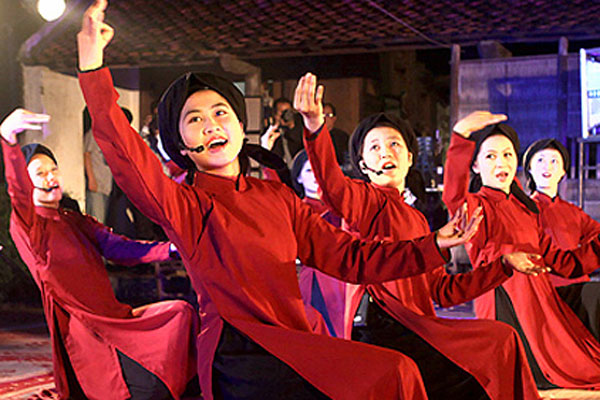Xoan singing escapes from urgent safeguarding list
VGP – The UNESCO Inter-governmental Committee for the Safeguarding of the Intangible Cultural Heritage has recently removed Xoan singing, a folk music genre in Viet Nam’s northern midland province of Phu Tho from the List of Intangible Cultural Heritage in Need of Urgent Safeguarding and added to the Representative List of the Intangible Cultural Heritage of Humanity.
|
|
|
Illustration photo |
Xoan singing was the first heritage in the world in the List of Intangible Cultural Heritage in Need of Urgent Safeguarding to be transferred to the Representative List of the Intangible Cultural Heritage of Humanity.
Earlier, the heritage was recognized by UNESCO as in need of urgent protection on November 21, 2011.
At that time, there were only 13 Xoan singing clubs with nearly 300 members. To date, the number has risen to 33 clubs across the province.
Xoan singing is performed in front of communal halls during spring festivals. It is said to have originated about 4,000 years ago, during the time of the legendary Hung Kings.
Singing events were held not only to honor the founders of the nation and entertain villagers, but also to pray for good weather and harvests and depict daily life in rural areas.
Hence, besides Xoan singing, Viet Nam has 11 other heritages which were honored by the UNESCO as world intangible heritages including Hue royal court music (2003); the cultural space of Gong in the Central Highlands (2005); Bac Ninh province’s Quan ho or love duet singing (2009); ancient genre of chamber music – ca tru (2009); Giong festival and Soc temples in Ha Noi (2010), Hung King worship ritual (2012), amateur singing in southern Viet Nam – Don Ca Tai Tu (2013), Vi Giam folk singing of Nghe Tinh province (2014), tug-of-war game (2015), the traditional practice of worship of Mother Goddesses - “Tho Mau Tam Phu,” (2016), Bai Choi singing, a folk music genre practiced in Viet Nam’s central region./.
By Kim Loan


